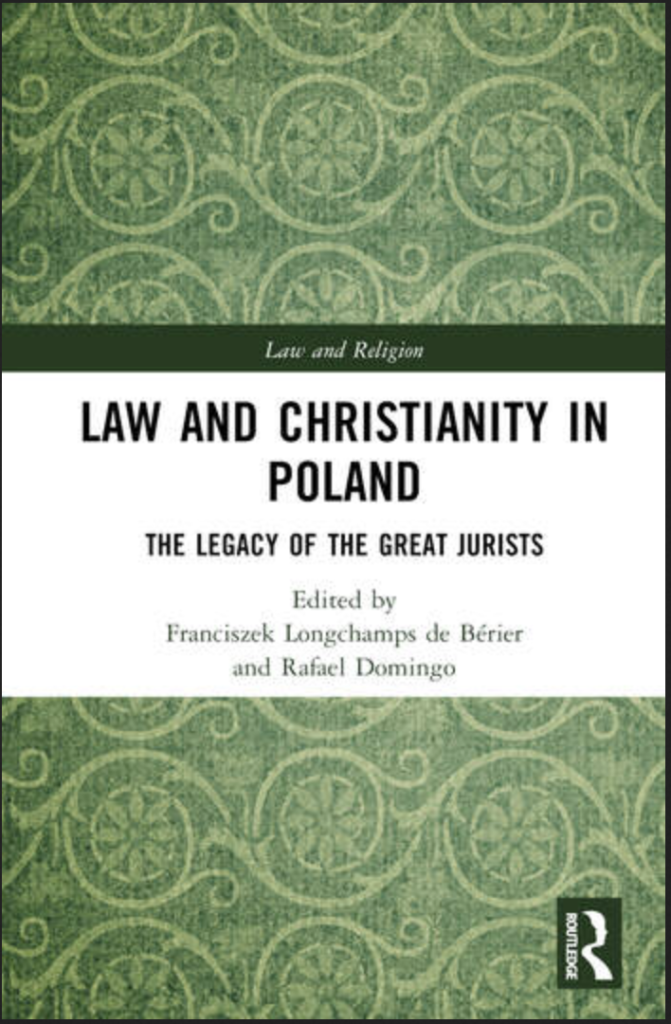
The Polish Contribution to the Global Legal Culture
Franciszek Longchamps de Bérier and Rafael Domingo
The following is excerpted from the Introduction of Law and Christianity in Poland: The Legacy of the Great Jurists, edited by Franciszek Longchamps de Bérier and Rafael Domingo and out now from Routledge.
Poland stands out considerably on the international scene for its contributions to music (Frédéric Chopin) and literature (Adam Mickiewicz), astronomy (Copernicus), mathematics (Stefan Banach, Stanisław Ulam), and chemistry (Marie Skłodowska-Curie, Jan Czochralski). The Polish contribution to legal culture is of lesser scope. Still, that contribution is also worthy of recognition, as it offers some precious lessons in constitutional law, international law, and human rights (especially the right to religious freedom). Poland, for instance, has a long tradition of protecting the peaceful coexistence of religions; it became one of the first countries to introduce universal women’s suffrage (1918). Following the Solidarity movement, Poland was the first country in Central and Eastern Europe to recover fundamental civil rights and liberate itself from communism (1989).
The Polish contribution to legal culture is the result of many factors, including geography, history, and a culture deeply rooted in Christianity. The geographically strategic location of Poland has allowed it to serve as a bridge between Western and Eastern Europe and between Latin and Orthodox Christianity. Poland’s central location and close contact with many other Slavic and non-Slavic groups allowed it to expand its borders until it became one of Europe’s dominant powers; however, its location also allowed it to be partitioned and stripped of its statusextinguished as a sovereign nation-state from 1795 to 1918.
Poland’s geographical position forced it to develop a flexible, open, and receptive legal culture. From its origins, Poland has fostered collaborative ties with other nations through diplomatic relations and has prioritized international law, religious toleration, and equality between pagan and Christian states. The ideas of Polish jurists such as Stanisław of Skarbimierz and Paweł Włodkowic preceded Francisco de Vitoria’s revolutionary approaches to the law of nations in areas related to just war, methods of warfare, and the moral responsibility to resist executing orders that violate justice.

Just as the Polish language contains numerous words borrowed from other languages, such as Czech, Latin, German, Hungarian, Italian, Turkish, French, and Russian, so too does Polish law borrow institutions, legal concepts, and categories from other legal systems, including both French and German law. In the newly reunified Poland of 1918, the Polish authorities applied five different civil laws at the same time, depending on the territorial areas: the French civil code, the Austrian civil code (ABGB), the uncodified Hungarian civil law, the Russian civil compilation (Svod Zakonov), and the German civil code (BGB). This open attitude to the legal regimes of other nations has also allowed Poland to handle complex legal situations successfully and to become a pioneer in domestic conflicts of law, comparative law, and international law.
Poland’s history includes fighting among medieval tribes, Christianization, expansion, a Golden Age, decline, collapse, invasion and partition, uprisings against foreign empires, the Great Emigration, European wars, national rebirth, the Second World War, Nazi invasion and occupation, deportations to Siberia, communism, and democracy. Poland has left the world with probably the most dramatic and heartbreaking images in the history of humanity (Auschwitz and the destruction of Warsaw in 1944), which show how far human barbarism can go when a human being is dehumanized, submerged in hatred, or trapped by an insatiable desire for dominance and power, as happened during the German invasion of Poland.
The tragic history of Poland teaches legal actors how vital it is for a legal system to be established and applied in the interest of justice and the common good rather than in service to powerful state machinery. The history of Poland encourages legal systems to respect the necessary and inalienable connection between morality and law, to recognize natural moral law and the notion of solidarity as a limit of positive law, and to protect the dignity of the human person and human rights with all the legal instruments at their disposal.
Polish history proclaims to legal and political actors the need and value of limiting the personal power of the sovereign. Poland developed a parliamentary system that avoided absolutism and promoted for centuries an elective kingship by the “grace of God and the will of the nation.”
Polandish law was a pioneered in the application of crucial aspects of the rule of law: In Polonia, non rex est lex, sed lex est rex (In Poland, the king is not the law, but the law is king). Polish law also was a defender of the doctrine of habeas corpus through the application of the medieval rule (1430–33) neminem captivabimus nisi iure victum (We shall not imprison anyone who has not been defeated by law). This privilege guaranteed due process to the Polish nobility (a right which was eventually extended to all citizens) even before the English Habeas Corpus Act was promulgated in 1679. Poland was also one of the first countries in Europe to ban torture.
Finally, Christianity has been linked to Poland from the country’s origins as an independent duchy in Central Europe to today. To deal with the founding of Poland is to deal with a Christian event, the so-called Baptism of Poland in 966, which had enormous historical consequences. But one thousand years later, the fall of communism and the democratization of Poland in 1989 can also be considered a Christian event, one led spiritually by a “universal Pole”: Pope John Paul II.
If Christianity is inherent to Polish culture, canon law is also intrinsic to Polish legal culture. Canon law influenced the compilation of Polish customary law (for example, the Statute of Wiślica), private law (wills and donations), criminal law (the doctrine of personal liability), procedural law (evidence and appeals), and constitutional law (the principle of royal power), among other areas.
In a broader sense, Christian values, such as hope, respect, solidarity, inclusion, and forgiveness, illuminate the Poles and frame their legal system. Poland has survived as a nation because Poles love their country as a fatherland, and in their suffering, they found a purpose. They fought for their independence and freedom. The Polish priest Maximilian Kolbe, who sacrificed his life for another man in Auschwitz, became a symbolic icon of love and forgiveness to the enemies. In 1939, Nazi Germany invaded Poland and partitioned the country with the Soviet Union. Today, Germany and Poland are NATO and European Union allies and partners. These days, legendary Polish solidarity is giving the world an example of supporting Ukrainian refugees during the Russian invasion of Ukraine, making Poland a worldwide symbol of freedom, respect, and human dignity.
All these values constitute the spirit of the Poles and their law. And this courageous spirit is embodied in very different ways and under many different historical circumstances in the twenty-one Christian jurists introduced in this volume.

Franciszek Longchamps de Bérier is Professor of Law and the Head of the Department of Roman Law at the Faculty of Law and Administration of the Jagiellonian University in Kraków; he also teaches at the Faculty of Law and Administration of the University of Warsaw, Poland.

Rafael Domingo is Spruill family Professor of Law and religion at Emory University and Alvaro d’Ors Professor of Law at the University of Navarra.
Recommended Citation
Longchamps de Bérier, Franciszek & Domingo, Rafael. “The Polish Contribution to the Global Legal Culture.” Canopy Forum, February 21, 2023. https://canopyforum.org/2023/02/21/the-polish-contribution-to-the-global-legal-culture.

